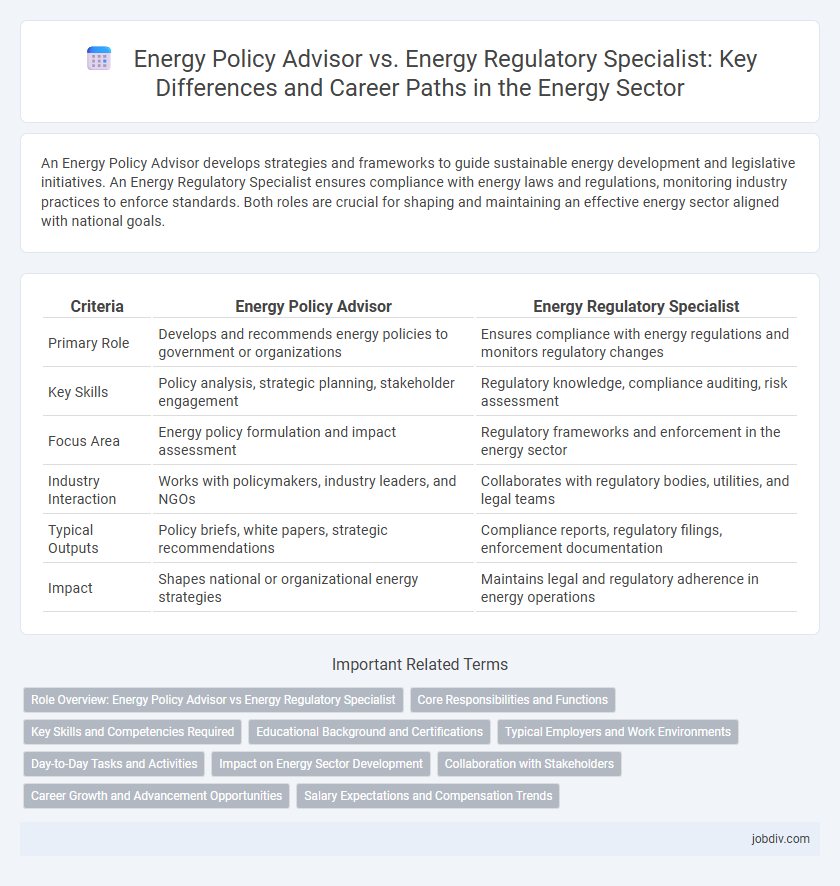An Energy Policy Advisor develops strategies and frameworks to guide sustainable energy development and legislative initiatives. An Energy Regulatory Specialist ensures compliance with energy laws and regulations, monitoring industry practices to enforce standards. Both roles are crucial for shaping and maintaining an effective energy sector aligned with national goals.
Table of Comparison
| Criteria | Energy Policy Advisor | Energy Regulatory Specialist |
|---|---|---|
| Primary Role | Develops and recommends energy policies to government or organizations | Ensures compliance with energy regulations and monitors regulatory changes |
| Key Skills | Policy analysis, strategic planning, stakeholder engagement | Regulatory knowledge, compliance auditing, risk assessment |
| Focus Area | Energy policy formulation and impact assessment | Regulatory frameworks and enforcement in the energy sector |
| Industry Interaction | Works with policymakers, industry leaders, and NGOs | Collaborates with regulatory bodies, utilities, and legal teams |
| Typical Outputs | Policy briefs, white papers, strategic recommendations | Compliance reports, regulatory filings, enforcement documentation |
| Impact | Shapes national or organizational energy strategies | Maintains legal and regulatory adherence in energy operations |
Role Overview: Energy Policy Advisor vs Energy Regulatory Specialist
Energy Policy Advisors analyze and develop strategic frameworks to guide national and regional energy initiatives, focusing on sustainability, economic impact, and legislative compliance. Energy Regulatory Specialists interpret and enforce regulatory requirements, ensuring energy providers comply with laws and standards while facilitating communication between government agencies and industry stakeholders. Both roles are critical for shaping energy governance, with Advisors emphasizing policy development and Specialists concentrating on regulatory implementation.
Core Responsibilities and Functions
Energy Policy Advisors analyze and develop strategies to influence government policies, focusing on sustainable energy initiatives, regulatory compliance, and economic impact assessment. Energy Regulatory Specialists ensure adherence to energy laws and regulations by monitoring utility companies, reviewing compliance reports, and facilitating communication between regulatory bodies and stakeholders. Both roles require expert knowledge of energy markets, legal frameworks, and policy implementation but differ in their emphasis on policy formulation versus regulatory enforcement.
Key Skills and Competencies Required
Energy Policy Advisors require expertise in policy analysis, stakeholder engagement, and strategic planning to develop effective energy frameworks aligned with sustainability goals. Energy Regulatory Specialists must possess in-depth knowledge of regulatory compliance, legal frameworks, and technical energy systems to ensure adherence to government standards and facilitate licensing processes. Both roles demand strong analytical skills and a comprehensive understanding of energy markets, but Policy Advisors focus more on policy advocacy while Regulatory Specialists emphasize enforcement and operational compliance.
Educational Background and Certifications
Energy Policy Advisors typically hold advanced degrees in public policy, environmental science, or energy management, often complemented by certifications like Certified Energy Manager (CEM) or Project Management Professional (PMP). Energy Regulatory Specialists usually possess educational backgrounds in law, regulatory affairs, or engineering, with specialized certifications such as Regulatory Affairs Certification (RAC) or Certified Energy Auditor (CEA). Both roles demand a strong understanding of energy regulations and policies, but their certifications emphasize strategic policy planning versus compliance and regulatory expertise.
Typical Employers and Work Environments
Energy Policy Advisors typically work for government agencies, think tanks, and policy research organizations where they develop and analyze energy policies to influence legislation and regulatory frameworks. Energy Regulatory Specialists are often employed by utility companies, regulatory commissions, and legal firms specializing in energy compliance, ensuring adherence to energy laws and regulations. Both roles frequently operate in office settings, engaging with stakeholders through meetings, but Policy Advisors may also participate in public forums and legislative sessions more regularly.
Day-to-Day Tasks and Activities
Energy Policy Advisors analyze and develop strategic policies to promote sustainable energy use, engaging in research, stakeholder consultations, and drafting legislation to influence energy markets and regulations. Energy Regulatory Specialists focus on ensuring compliance with existing energy laws and regulations by monitoring utility operations, conducting audits, and reviewing rate cases to protect consumer interests. Both roles require strong knowledge of energy regulations, but Advisors prioritize policy development while Specialists emphasize regulatory enforcement and compliance management.
Impact on Energy Sector Development
Energy Policy Advisors shape regulatory frameworks that drive sustainable energy sector growth by analyzing market trends and advising on policy implementation. Energy Regulatory Specialists ensure compliance with energy laws and standards, facilitating reliable and efficient energy distribution. Both roles critically influence energy sector development through strategic guidance and regulatory oversight.
Collaboration with Stakeholders
Energy Policy Advisors and Energy Regulatory Specialists both emphasize collaboration with stakeholders to drive effective energy solutions. Energy Policy Advisors engage with government agencies, industry leaders, and community groups to formulate policies that balance environmental sustainability and economic growth. Energy Regulatory Specialists work closely with regulatory bodies, utility companies, and consumer advocates to ensure compliance with energy regulations and facilitate transparent communication during regulatory processes.
Career Growth and Advancement Opportunities
Energy Policy Advisors typically experience career growth through strategic roles involving policy formulation, stakeholder engagement, and influence on national energy frameworks, offering pathways to senior government or consultancy positions. Energy Regulatory Specialists advance by mastering compliance, regulatory analysis, and enforcement within energy markets, leading to opportunities in regulatory agencies, legal advisory roles, or corporate regulatory affairs. Both career paths demand up-to-date knowledge of energy laws and market trends, with advancement often linked to expertise in sustainable energy and emerging technologies.
Salary Expectations and Compensation Trends
Energy Policy Advisors typically command higher salaries due to their strategic role in shaping national energy frameworks and influencing legislative decisions, with average compensation ranging from $85,000 to $130,000 annually. Energy Regulatory Specialists, focusing on compliance and regulatory enforcement, usually earn between $70,000 and $110,000, reflecting the technical and procedural expertise required within government agencies and utility firms. Compensation trends in the energy sector show increasing premiums for professionals with expertise in renewable energy policies and regulatory technologies, driven by evolving environmental regulations and market demand.
Energy Policy Advisor vs Energy Regulatory Specialist Infographic

 jobdiv.com
jobdiv.com